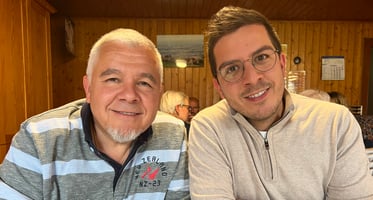According to you, what is Supply Chain? In short: Supply Chain is the oil in the engine. We are...
Sustainability in Supply Chain, getting started: Podcast Transcript
Tim Foetisch (00:00)
Hello everyone. Welcome to the second episode of Supply Chain Operations Podcast, dedicated to Supply Chain management. We focus here on Supply Chain in the healthcare industry, and today we'd like to discuss and exchange a bit more about sustainability. We just recently published an article on starting the sustainability journey in a Supply Chain. So today I'm sitting with Lauren Foetisch, the managing director of Supply Chain Operations, and I'd like him to introduce himself and then we can get going about the article itself.
Laurent Foetisch (00:32)
Hello, my name is Laurent Foetisch. I'm the managing director of Supply Chain Operations. And I'm really looking forward to have this discussion today with your Tim. Great to have you on board at Supply Chain Operations, and really fantastic to extend our services within Supply Chain Operations to sustainability. So why did you want to create this article?
Tim Foetisch (00:58)
So, it's an extremely good question. Very early on when I joined Supply Chain Operations, I wanted to bring on board my knowledge on sustainability. I've been working over the past 10 years in Supply Chain and logistic management, and sustainability was one of my focus area. And arriving in Supply Chain Operations, I thought it would be great to develop our services in the field of sustainability in the Supply Chain. But when we started, we actually identified that the majority of our customer, which are small to mid-size pharma companies are actually very low in terms of maturity on sustainability, and that they don't really even know what it means. What is sustainability?
Laurent Foetisch (01:38)
More concretely? What does it mean for you and for our customers? What is the value that you can bring to them and why you think it is important?
Tim Foetisch (01:50)
Well, you know, sustainability, I mean, first of all, I think it's very important to define and to know what we're talking about. So sustainability can be identified as many different things. And the first gap to close is to explain, to teach and to bring, first of all the management, but then also the team on board on defining what is sustainability, what are the key stakes, and to really show that there is some value in the business because first of all, it matters. And second of all, there is a very important expectation from the stakeholders, being internal, but also external. So for us, it's really important to get started by defining what is sustainability, and very often to move away from the simple idea that it's about carbon reporting, and to go in more depth about the different opportunity that it represent within the Supply Chain.
Laurent Foetisch (02:45)
They are a lot of opportunity within Supply Chain when we talk about packaging, when we talk how our product are manufactured you know, the carbon footprint is one thing, but there are other things where you can, we can influence drastically the sustainability of a company. Can you describe them?
Tim Foetisch (03:07)
Yes. I mean, of course. I think this is very important. There are many different ways and there are very different area focused depending on the industry we are in. But to, to be kind of high level I think you touched upon packaging. Packaging is a key element where we to touch topics like waste management, but also the impact on natural resources. And we already hear quite a lot happening in that direction because of regulation. And we will see that in the future, more and more heavy regulation will come into place. So either we can wait and then react on those new regulation, or the alternative is to anticipate and to believe in it, and by believing in it, anticipating the new requirements and developing new solutions. But very often it actually means to go in very deep reflections and very, very quickly in sustainability you need to go deep into the changes to actually have an impact. So you start the journey by reporting, and by reporting you can then identify, you know, the key areas where there is the most meat on the bone, and on that area you can then really think of alternative. Very often the best results are when you completely, completely take a step back and you redesign the model.
Laurent Foetisch (04:27)
Talk about reporting. Yes, that's certainly one thing, but you need also to understand and assess how the Supply Chain of you know, the client is built, is organised, what are the key drivers in terms of sustainability and improvement to the reporting that you mentioned. So there is a deep understanding of what is happening within the Supply Chain of our clients. How do you perform this activity?
Tim Foetisch (04:57)
So there is a couple of standards that are either coming from the regulation, either let's say standard from the market that you can capitalize on to start your reporting. And it's really important to fit into those framework and to start reporting into that. And here, I especially refer to for the carbon emission, for instance, to the science-based target initiative where you need to define the different scope of emission within your organization. And as Supply Chain, we actually usually playing a very important role within the total emission of a company because all emission of scope 3, which are the emissions that are coming from external companies, but that are generated from our activities. For instance, all our suppliers and the transportation of goods, this is usually where the most meat is on the bone. So it's very important as Supply Chain experts and as supply chainers to map the current network of supplier to map the current impact of our suppliers, and then when we aim at reducing to onboard them. So it's a multi-stakeholder approach, and usually if you sit alone in your room, you will have very little results.
Laurent Foetisch (06:09)
Okay. That's great. So you go and meet your customers and you are with them during this journey, is that correct?
Tim Foetisch (06:17)
So, so the best approach and where you will drive the most result is where you are multi stakeholders. So indeed, you should sit around with all the key stakeholders. It could be your customers, but you can also be your suppliers. And depending on the model and what you're trying to change, you need to see it with both of them, because the change, as I mentioned earlier, will be deep. So let's take for example, the example the idea of changing a packaging. So you decide to move from this type of packaging or to, from a plastic packaging, to a paper-based packaging. So obviously you need to inform your supplier because your current supplier may or may not have the knowledge and the know-how to actually do the switch for you or with you. So in one case, you can actually have a new journey with them developing that new solution, which is, for instance, paper-based, or you will need to change the supplier. So here, impact are strong. And on the other side of the spectrum, if one day you decide to move from plastic to paper let's say for syringes or packaging of a syringe then you really have to have the customer on board because they may have very strong reaction about this new way of packing, and they actually may simply say no to it. So stakeholder management, being upstream and downstream is extremely important to have strong impacts on the long run.
Laurent Foetisch (07:38)
Thank you for your answer. We talk a lot also when we talk about sustainability, we talk a lot about circular economy. Can you describe within the biopharmaceutical sector, what does it mean circular economy, if you can give us some example.
Tim Foetisch (07:58)
Yes. So the idea of circular economy is to move away from a linear economy. So first of all, let's define a linear economy where we take resources, we put those resources together, we transform those resources, we use them somehow, and then we dispose of them. So this has been the way that our economies have been built over the past century. Circular economy is very different in the idea that there is no end life. So you will really continue using the product, and you really think the economy in a different way. So instead of using, transforming and then putting to the bin, you really think to identify ways where you can keep using it over and over, up to the up to the moment it cannot be used anymore. So for instance, very interesting example that the pharma industry could move onto is the idea of single use packaging. Maybe there are ways that we could develop stronger elements whatever the type of elements, whatever the type of component, but stronger that they could last longer. And instead of using/scrapping, we could use and then refit for purpose and then reuse. So this is really about the idea lying on the circular economic concept.
Laurent Foetisch (09:15)
Yeah, thank you. There is a disease that we see also within the biopharmaceutical Supply Chain is what I call the product tourism. Meaning that the product from API to drug substance, to drug product, to finish product, they go and fly around the world sometimes several times. So how could you address this within your sustainability initiative?
Tim Foetisch (09:42)
Thank you for asking the question. Actually. It's very interesting because one of the customer that we accompanied had exactly this question in mind, and they were really willing to reduce the emission related to transport. So they were asking us to find ways to reduce the emission of transportation. So, okay, you can switch from air to sea transport, you can identify with some providers moving away from fuel engine to electric or to hydrogen or to whatever new type of solution there is on the market. But if you do that, actually the impact it will have on your overall emission is very little. You know, you are talking about a few percentage. Where the meat is, and where you can have really deep effect is what, if you are ready to put on the table the question of localization and the design network of your Supply Chain. If you are ready to really understand how your network works overall, by doing that exercise, you will of course have very, very strong impact and very strong reduction of emission of your Supply Chain. So this is very interesting where you can see that, you know if you want to have transformation, you need to actually change the full spectrum of your Operations and not simply a variable of the, of on the type of transport you are using.
Laurent Foetisch (11:02)
Thank you. We know also that our industry especially also within the Supply Chain sector we are quite reluctant to changes because we are working and working and living in a regulated environment. So when you talk about change management for sustainability, there must be a big impact also on a quality point of view related to all the SOPs, all the systems that are registered and that you cannot change so easily. Can you comment on that?
Tim Foetisch (11:39)
Yes, and I would argue that this is actually one of the key break that we need to address. So this is where this is where the industry is always very reluctant. I mean, we have example of companies very recently that had the opportunity to leverage the same transport, for instance, from A to B, and that actually did not because of those regulatory requirements and because they were not able to manage the quality in that mutualized process. So indeed, I think one of the key lever that we can work as an industry-wide is thinking about how we can mutualize our service and how we can mutualize the different flows that we have around the world. And this should be more and more possible thanks to big data and the connectivity of the Supply Chain.
Laurent Foetisch (12:26)
Yeah. Thank you Tim. Thanks for your answers. And you know, this is all great inputs and please contact us at Supply Chain Operations for any related question to sustainability within the biopharmaceutical Supply Chain.
Tim Foetisch (12:43)
Yeah, I mean, thank you Laurent. It was great talking with you. Have a look at our article dedicated on the topic on our blog, and feel free to comment or to share your thought. I speak to you soon and thank you for listening.
Read the related article!




